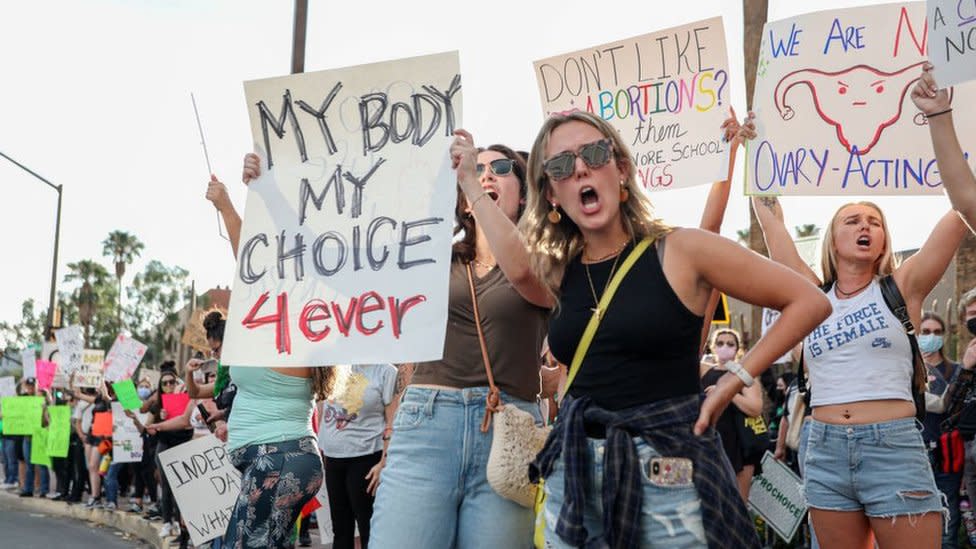Arizona abortion ban: What you need to know

On Tuesday, the Arizona Supreme Court reinstated a law from 1864 that bans nearly all abortions in the state.
The 160-year-old law - which predates Arizona becoming a US state - makes performing an abortion punishable by two to five years in prison, except when the mother's life is at risk.
Questions have emerged since about what it means for the legality of abortion in Arizona now and in the future.
Several things remain uncertain, but here's what we know:
What is the 1864 law?
The law, enacted before Arizona became a state in 1912, bars abortion from the moment of conception, except when necessary to save the life of the mother. It does not allow exceptions for cases of rape or incest.
Under this statute, any person who aids or assists with an abortion can be punished with fines and a prison term "not less than two years nor more than five years". Similar language was later codified into Arizona's criminal code.
The Supreme Court's 1973 ruling in Roe v Wade, which established a nationwide right to abortion, meant the law wasn't enforced for nearly 50 years. Since the court reversed that decision in 2022, supporters and opponents of abortion in Arizona have been fighting over whether the 1864 could again be implemented.
What does the ruling say?
In a 4-2 ruling, the Arizona Supreme Court wrote that because Roe had been overturned, the 1864 law was "now enforceable".
The justices - all nominated by Republican governors - also noted the state legislature had not guaranteed a right to abortion when it had passed a 15-week abortion ban in 2022.
"Physicians are now on notice that all abortions, except those necessary to save a woman's life, are illegal," they wrote.
Is it still possible to have an abortion in Arizona?
The procedure has been available and legal in the state up to 15 weeks of pregnancy.
This availability is now in jeopardy. But it remains to be seen when or how it would be curtailed.
The court has put the law on hold for 14 days and sent the case back to a lower court to hear additional arguments about its constitutionality. On top of that, there is a 45-day period before enforcement.
And there are further questions about how state authorities will respond. Last year, Arizona Governor Katie Hobbs, a Democrat, delegated authority of abortion-related prosecutions to Attorney General Kris Mayes.
Ms Mayes, also a Democrat, has said she will not prosecute Arizonans for performing or obtaining abortions - a stance she reiterated this week, calling the law "draconian" and "an affront to freedom".
Early efforts by state Democrats to repeal the law were thwarted by their Republican colleagues, who blocked bills in both the House and the Senate.
What about in other states?
It depends on the state.
Since Roe was overturned, federal protections to abortions have been reversed and fierce legal and legislative fights have erupted at the state level. This has created a fragmented map of where the procedure is legal and accessible in the US.
Several states now have total bans on abortion, including Texas, Oklahoma and Arkansas.
In other states, like Florida, there is an ongoing and intense debate on the legality of abortion. Florida law allows the procedure up to 15 weeks of pregnancy, but Governor Ron DeSantis is pushing for that window to be shortened to six weeks.
Meanwhile, an initiative on the November ballot will ask whether the state's Constitution should be amended to guarantee the right to an abortion.
The measure, which could reverse all abortion bans in Florida, would require 60% approval to pass.
Other states have been successful in enshrining abortion access in their constitutions since Roe's reversal, like Colorado, Kansas and Michigan.
Will the 1864 law be overturned?
It remains to be seen, but it is a likely possibility.
In the majority opinion, the judges stated that "policy matters of this gravity must ultimately be resolved by our citizens through the legislature or the initiative process."
This puts the ball in the court of state legislators, who could cancel the ban.
It also opens the possibility for voters to decide on the issue in November, should abortion rights groups in Arizona succeed in putting the question on the ballot.
